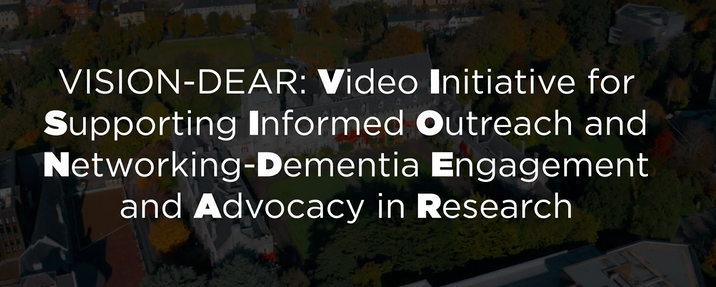In This Section
- PPI Case Studies
- PPI Resources
- Introduction to PPI
- Difference between PPI and qualitative research
- Involving children and young people in research
- PPI and doctoral research
- PPI in systematic reviews
- PPI in qualitative analysis
- Reporting PPI
- PPI in funding applications
- Budgeting for PPI
- PPI and lab-based research
- Evaluating PPI
- Events and Seminars
- Previous Summer Students
- News and Events
- About Us
- PPI Seed Funding Scheme 2023
- PPI Shared Learning Group for PhD Researchers
- PPI Ignite Network@ UCC Mailing List
- Digital Badge
VISION-DEAR: Showcasing Meaningful Partnerships in Dementia Research

The VISION-DEAR project brought researchers and people with lived experience of dementia together to co-create a powerful video about meaningful public and patient involvement in research.
VISION-DEAR: Video Initiative for Supporting Informed Outreach and Networking-Dementia Engagement and Advocacy in Research
Project Summary
The VISION-DEAR project aimed to produce a high-quality, accessible video resource to raise awareness of Public and Patient Involvement (PPI) in dementia research, and to encourage meaningful engagement between researchers and members of the public, including people living with dementia and their carers. Central objectives included educating the public about how to become involved in research, guiding researchers on initiating PPI partnerships, and creating a legacy resource that supports a sustained culture of PPI within UCC and beyond.
PPI was embedded from the outset, beginning with early co-design discussions prior to funding application. The project brought together academic researchers and public contributors, including individuals with lived experience of dementia, to co-develop the project vision, storyboard the video, review recorded content, and guide editing decisions.
The core activity was the co-creation of a 12-minute video showcasing meaningful PPI in dementia research (see the video here). The team collaboratively developed a storyboard, filmed over two half-days, and met regularly to review footage, refine the narrative and shape a dynamic, final video. Independent editing feedback from two experienced PPI stakeholders helped ensure clarity, relevance, and tone.
PPI contributors were embedded throughout, informing content, messaging, and dissemination planning, ensuring the video reflects lived experience and resonates with intended audiences.
The project produced a high-quality 4K video hosted on the PPI Ignite @ UCC YouTube channel. It outlines what PPI is, why it matters, and how to embed it in dementia research. The video has been widely shared on social media and embedded on key partner websites.
Within a week of launch, the video reached hundreds of viewers and has since become a lasting, accessible resource supporting meaningful engagement in dementia research. It has also inspired new initiatives, including a Global PPI Collaborative Certification in Dementia through the Irish Research Council’s New Foundations programme.
